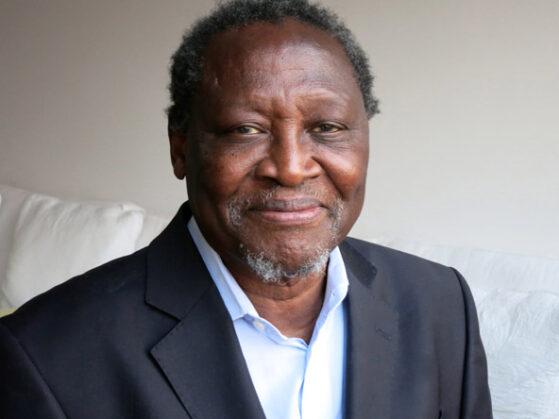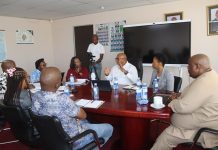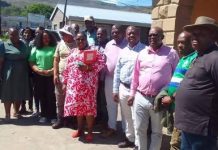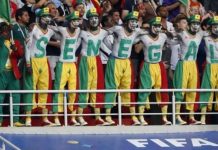Africa-Press – Lesotho. One of Africa’s foremost development economists and long-time advocate of continental unity, Thandika Mkandawire passed away in Stockholm, Sweden, on 27 March 2020, after a long battle with cancer He helped develop a formidable community of African social scientists during his professional career that spanned half a century.
Those, like me, who knew him from his days at the Council for the Development of Social Science Research in Africa (CODESRIA ) in 1978, are grateful for having been associated with this great man, my elder brother.
Born in Gwanda, Zimbabwe, of a Zimbabwean mother and a Malawian father, Mkandawire spent most of his formative years as a student in Zimbabwe, in the Copperbelt of Zambia, and arrived in Malawi at age 13.
As a young man Mkandawire joined the nationalist struggle for independence in Malawi. During that time, he worked as a journalist until he was exiled by Kamuzu Banda in 1965, ending up as a political refugee in Sweden.
CODESRIA, the Dakar-based organization that Thandika helped to establish in 1978, was among the first to announce his passing, describing him as “a brilliant economist and prodigious scholar whose works on African political economy challenged dominant ways of seeing the African continent on a wide range of issues that included structural adjustment and economic reform, democratic politics, neopatrimonialism and insurgent violence.
” Mkandawire was Executive Secretary of CODESRIA from 1985 to 1996. During the organisation’s formative years, he played a central role as it became the platform for radical African scholars.
It extended its tentacles across the African continent and to its diaspora, thereby rendering irrelevant the old colonial and linguistic divides of “Anglophone”, “Francophone”, “Lusophone”, or even “Arabophone” in favour of a Pan-Africanism thrust that was contagious and irresistible.
Mkandawire was a Pan-African par excellence, not confined to the boundaries of a nation-state. To this day, the CODESRIA’s General Assembly in Dakar is a “pilgrimage”, as Africa’s social science organizations gather for a week of deliberations, bringing together some of the best of the continent’s minds.
Despite CODESRIA being his home, he spent much time away, working closely with other scholars and academic institutions. In 1982 to 1985, we succeeded in persuading the organisation to make use of his services at the new Zimbabwe Institute of Development Studies (ZIDS).
Following the end of his term at CODESRIA, he moved on to head UNRISD in Geneva from 1996 to 2006. Soon after that, he took on the position of distinguished professor of African Development at the London School of Economics.
On 11 April 2016, CODESRIA organized a three day conference in Lilongwe, Malawi, on the theme of ‘Thinking African Epistemological Issues: Celebrating the Life and work of Thandika Mkandawire’.
Along with other contemporaries like Peter Anyang’ Nyongo and Mike Chege of Kenya, Helmy Sharawi of Egypt, Abdoulaye Bathily of Senegal, I was honoured to be privy to an occasion that, in retrospect, was a fitting farewell to my elder brother and comrade.
The Lilongwe meeting helped me understand that Mkandawire was a Pan-African par excellence, not confined to the boundaries of a nation-state. It also reminded me of one of the most emotional episodes I have ever witnessed. It was 1994 in Blantyre, Malawi.
The occasion was a book the launch of Malawi at the Crossroads: The post-colonial political economy, written by Malawians (most of them in exile at the time – before the demise of Kamuzu Banda in 1994), edited by Mkandawire‘s cousin Guy Mhone and published by Sapes Books in Harare.
For Mkandawire and Mhone, this was their return to Malawi after 32 years in exile. Mkandawire wrote about it in his obituary for Guy Mhone in 2005. He was so moved by the event and by the opportunity to finally participate in an intellectual event in Malawi that he broke down in tears and was not able to complete his speech.
For me, it was a measure of his emotional strength that he saw the event to the end. Most of of us who packed into the Ryans Hotel in Blantyre that night were overcome by the poignancy of the moment: the return, after more than 30 years in exile, of two of the best intellectuals from Malawi.
It was an opportunity to know and understand the selfless, humble but imposing personality of Thandika Mkandawire. Through him, I grew to understand the tragedy of post-independent Malawi, for its violence and intolerance under Kamuzu Banda; sadly a situation that has been repeated across Africa in the post-colonial era.
In Zimbabwe we remember him for his sterling work at the Zimbabwe Institute of Development Studies (ZIDS), an institute I helped establish in 1981 on the back of the (short-lived) euphoria that accompanied our independence in 1980.
We had hoped the ideals from our struggle for liberation could be sustained and developed through the mobilization of the best intellectuals and technocrats at Zimbabwe’s disposal.
Mkandawire did his best under difficult circumstances, including a state increasingly overwhelmed by its own failures and a growing mistrust for intellectuals.
There was a growing demand for African scholars to be at the forefront of the studies of their respective countries and break the dominance of other researchers on the analysis of the African reality.
But not even he could save ZIDS which, upon his departure in 1985, was left to an uncertain future at the University of Zimbabwe, only to be shut down a decade later.
Yet, it was during Mkandawire’s tenure at ZIDS, and in conjunction with CODESRIA’s series of national research working groups, that he helped showcase Zimbabwe’s academia through the book, Zimbabwe: The political Economy of Transition 1980-1986, edited by myself and those young scholars who were members of ZIDS and went on to become prominent public intellectuals.
As Thandika Mkandawire wrote in his foreword for Zimbabwe: The political Economy of Transition 1980-1986, the national research working groups – which CODESRIA had established at the time – were part of the capacity building efforts towards the “indigenization” of scholars in Africa, as a challenge to the “African Studies” industries of the northern hemisphere :
There was a growing demand for African scholars to be at the forefront of the studies of their respective countries and break the dominance of other researchers on the analysis of the African reality. The history of pan-Africanism is characterized by seesaw-like shifts in emphasis as continental or diasporic issues have become dominant.
If Africa was to be developed, it was dependent on African scholars who formed a large part of our understanding of our societies, through an emphasis that this knowledge be generated from within Africa.
This book by Zimbabwean researchers is part of CODESRIA’s contribution to extending Africa’s sovereignty in the realm of scientific mastery of the continent’s reality and destiny.
In conclusion, we have to remember among many of Thandika Mkandawire’s outstanding attributes, his greatest one was his Pan-Africanism. In his own words:
“The history of pan-Africanism is characterized by seesaw-like shifts in emphasis as continental or diasporic issues have become dominant.
In Africa, as elsewhere, diasporas have played an important role in the reinvention and revitalisation of the ‘homeland’ identity and sense of itself.
And today, with the increased capacity to participate in the political life of their homelands, there can be no doubt that the diaspora will be even more immediate to the rethinking of a new Africa.
Thandika Mkandawire is survived by his partner Kaarina Klint and his two sons, Andre and Joshua; plus the six children left by his late brothers, and three grandchildren.
For More News And Analysis About Lesotho Follow Africa-Press






